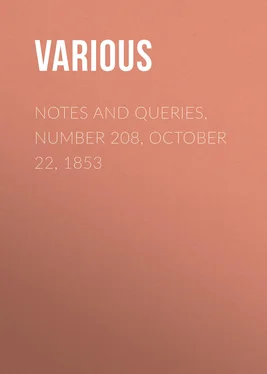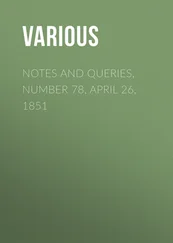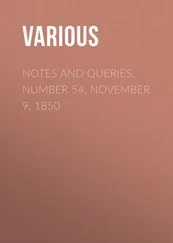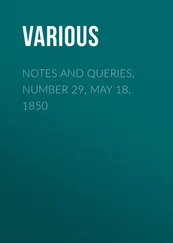Various - Notes and Queries, Number 208, October 22, 1853
Здесь есть возможность читать онлайн «Various - Notes and Queries, Number 208, October 22, 1853» — ознакомительный отрывок электронной книги совершенно бесплатно, а после прочтения отрывка купить полную версию. В некоторых случаях можно слушать аудио, скачать через торрент в формате fb2 и присутствует краткое содержание. Жанр: foreign_antique, periodic, foreign_edu, на английском языке. Описание произведения, (предисловие) а так же отзывы посетителей доступны на портале библиотеки ЛибКат.
- Название:Notes and Queries, Number 208, October 22, 1853
- Автор:
- Жанр:
- Год:неизвестен
- ISBN:нет данных
- Рейтинг книги:4 / 5. Голосов: 1
-
Избранное:Добавить в избранное
- Отзывы:
-
Ваша оценка:
- 80
- 1
- 2
- 3
- 4
- 5
Notes and Queries, Number 208, October 22, 1853: краткое содержание, описание и аннотация
Предлагаем к чтению аннотацию, описание, краткое содержание или предисловие (зависит от того, что написал сам автор книги «Notes and Queries, Number 208, October 22, 1853»). Если вы не нашли необходимую информацию о книге — напишите в комментариях, мы постараемся отыскать её.
Notes and Queries, Number 208, October 22, 1853 — читать онлайн ознакомительный отрывок
Ниже представлен текст книги, разбитый по страницам. Система сохранения места последней прочитанной страницы, позволяет с удобством читать онлайн бесплатно книгу «Notes and Queries, Number 208, October 22, 1853», без необходимости каждый раз заново искать на чём Вы остановились. Поставьте закладку, и сможете в любой момент перейти на страницу, на которой закончили чтение.
Интервал:
Закладка:
What I possess already are, 1. "Motiues inducing a Proiect for the Discouerie of the North Pole terrestriall; the streights of Anian, into the South Sea, and Coasts thereof," anno 1610. 2. Prince Henry's Instructions for the Voyage, together with King James's Letters of Credence, 1612. 3. A Letter from Sir Thomas Button to Secretary Dorchester, dated Cardiff, 16th Feb., 1629 (from the State Paper Office). 4. Sir Dudley Digges' little tract on the N.-W. Passage, written to promote the voyage, and of which there were two distinct impressions in 1611 and 1612. 5. Extracts from the Carleton Correspondence, and from the Hakluyt Society's volume on Voyages to the North-West.
I shall be glad also to learn the date, and any other facts connected with the death of John Davis, the discoverer of the Straits bearing his name.
John Petheram.94. High Holborn.
Minor Queries
The Words "Cash" and "Mob." —In Moore's Diary I find the following remark. Can any of your numerous readers throw any light on the subject?
"Lord Holland doubted whether the word 'Cash' was a legitimate English word, though, as Irving remarked, it is as old as Ben Jonson, there being a character called Cash in one of his comedies. Lord Holland said Mr. Fox was of opinion that the word 'Mob' was not genuine English."—Moore's Diary , vol. iii. p. 247.
Clericus Rusticus."History of Jesus Christ." —G. L. S. will feel obliged by any correspondent of "N. & Q." stating who is the author of the following work?—
"The History of the Incarnation, Life, Doctrine and Miracles, the Death, Resurrection, and Ascension of Our Blessed Lord and Saviour, Jesus Christ. In Seven Books; illustrated with Notes, and interspersed with Dissertations, theological, historical, geographical and critical.
"To which are added the Lives, Actions, and Sufferings of the Twelve Apostles; also of Saint Paul, Saint Mark, Saint Luke, and Saint Barnabas. Together with a Chronological Table from the beginning of the reign of Herod the Great to the end of the Apostolic Age. By a Divine of the Church of England.
"London: printed for T. Cooper, at the Globe, in Paternoster Row, 1737."
This work is in one folio volume, and all I can ascertain of its authorship is that it was not written by Bishop Gibson, of "Preservative" fame.
Quantity of the Latin Termination -anus. —Proper names having the termination -anus are always long in Latin and short in Greek; thus, the Claudiānus, Luciānus, &c. of the Latins are Κλαυδιᾰνος and Λουκιᾰνος in Greek. What is to be said of the word Χριστιανος? Is it long or short, admitting it to be long in the Latin tongue?
While on the subject of quantities, let me ask, where is the authority for that of the name of the queen of the Ethiopians, Candace, to be found? We always pronounce it long, but all books of authority mark it as short.
Anti-Barbarus.Webb and Walker Families. —Perhaps you or some of your numerous readers could inform me if the Christian names of Daniel and Roger were used 160 or 180 years ago by any of the numerous families of Webb or Webbe , resident in Wilts or elsewhere; and if so, in what family of that name? And is there any pedigree of them extant? and where is it to be found?
Was the Rev. Geo. Walker, the defender of Derry, connected with the Webbs? and if so, how, and with what family?
Is there any Webb mentioned in history at the siege of Derry? and if so, to what family of that name did he belong?
Gulielmus.Cawdrey's "Treasure of Similes." —I stumbled lately at a book-stall on a very curious old book entitled A Treasurie or Store-house of Similes both pleasant, delightfull, and profitable . The title-page is gone; but in an old hand on the cover it is stated to have been written by a certain "Cawdrey," and to have been printed in 1609, where I cannot discover. Can any of your correspondents oblige me with some information concerning him? The book is marked "scarce."
J. H. S.Point of Etiquette. —Will some of your numerous correspondents kindly inform me as to the rule in such a case as the following: when an elder brother has lost both his daughters in his old age, does the eldest daughter of the younger brother take the style of Miss Smith, Jones, Brown, or Robinson, as the case may be?
F. D., M.R.C.S.Napoleon's Spelling. —Macaulay, in his History of England , chap. vii., quotes, in a foot-note, a passage from a letter of William III., written in French to his ambassador at Paris, and then makes this remark, "The spelling is bad, but not worse than Napoleon's."
Can you refer me to some authentic proof of the fact that Napoleon was unable to spell correctly? It is well known that he affected to put his thoughts upon paper with great rapidity; and the consequence of this practice was, that in almost every word some letters were dropped, or their places indicated by dashes. But this was only one of those numerous contrivances, to which he was in the habit of resorting, in order to impress those around him with an idea of his greatness.
Henry H. Breen.St. Lucia.
Trench on Proverbs. —Mr. Trench, in this excellent little work, states that the usual translation of Psalm cxxvii. 2. is incorrect:
"Let me remind you of such [proverbs] also as the following, often quoted or alluded to by Greek and Latin authors: The net of the sleeping (fisherman) takes 3 3 "Εὕδοντι κύρτος αἱρεῖ. Dormienti rete trahit."
; a proverb the more interesting, that we have in the words of the Psalmist (Ps. cxxvii. 2.), were they accurately translated, a beautiful and perfect parallel; 'He giveth his beloved' (not 'sleep,' but) 'in their sleep;' his gifts gliding into their bosoms, they knowing not how, and as little expecting as leaving laboured for them."
The Hebrew is יִתֵּן לִידִידוֹ שֵׁנָא, the literal translation of which, "He giveth (or, He will give) to his beloved sleep," seems to me to be correct.
As Mr. Trench is a reader of "N. & Q.," perhaps he would have the kindness to mention in its pages the ground he has for his proposed translation.
E. M. B.Rings formerly worn by Ecclesiastics. —In describing the finger-ring found in the grave of the Venerable Bede, the writer of A brief Account of Durham Cathedral adds,—
"No priest, during the reign of Catholicity, was buried or enshrined without his ring."—P. 81.
I have seen a similar statement elsewhere, and wish to ask, 1st, Were priests formerly buried with the ring? 2ndly, If so, was it a mere custom, or was it ordered or authorised by any rubric or canon of our old English Church?
I am very strongly of opinion that such never was the custom, and that the statement above quoted has its origin in the confounding priests with bishops. Martene says, when speaking of the manner of burying bishops,—
"Episcopus debet habere annulum, quia sponsus est. Cæteri sacerdotes non, quia sponsi non sunt, sed amici sponsi vel vicarii."— De Antiquis Ecclesiæ Ritibus , lib. III. cap. xii. n. 11.
Ceyrep.Butler's "Lives of the Saints." —Can any of your correspondents supply a correct list of the various editions of this popular work? The notices in Watt and Lowndes are very unsatisfactory.
J. Yeowell.Marriage of Cousins. —It was asserted to me the other day that marriage with a second cousin is, by the laws of England, illegal, and that succession to property has been lately barred to the issue of such marriage, though the union of first cousins entails no such consequences. Is there any foundation for this statement?
J. P.Castle Thorpe 4 4 Pronounced Thrup .
, Bucks. —A traditional rhyme is current at this place which says that—
Интервал:
Закладка:
Похожие книги на «Notes and Queries, Number 208, October 22, 1853»
Представляем Вашему вниманию похожие книги на «Notes and Queries, Number 208, October 22, 1853» списком для выбора. Мы отобрали схожую по названию и смыслу литературу в надежде предоставить читателям больше вариантов отыскать новые, интересные, ещё непрочитанные произведения.
Обсуждение, отзывы о книге «Notes and Queries, Number 208, October 22, 1853» и просто собственные мнения читателей. Оставьте ваши комментарии, напишите, что Вы думаете о произведении, его смысле или главных героях. Укажите что конкретно понравилось, а что нет, и почему Вы так считаете.












